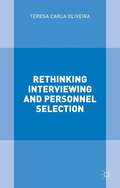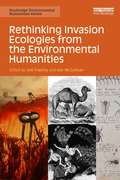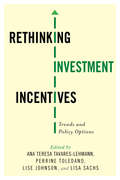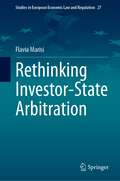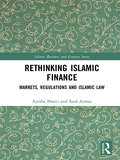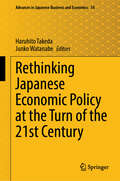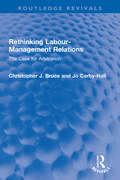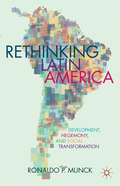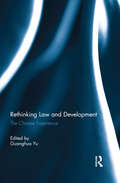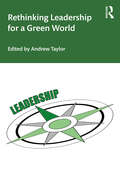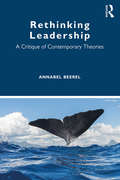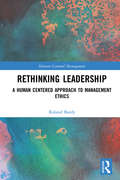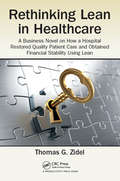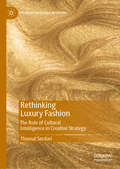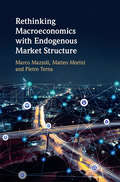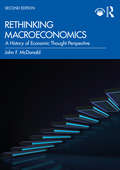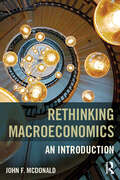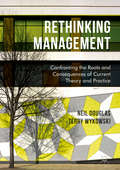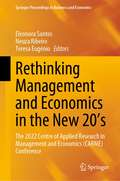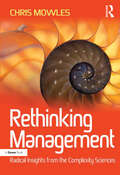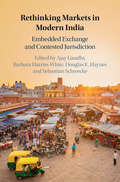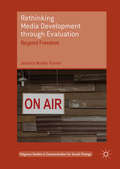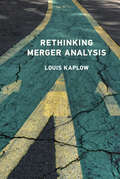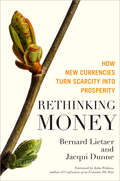- Table View
- List View
Rethinking Interviewing and Personnel Selection
by Teresa Carla OliveiraThe case studies in Rethinking Interviewing and Personnel Selection find support for Herriot (1993, 2003) and Fletcher's (1997, 2003) claims that the selection interview is a social process which may gain from a degree of semi-structured interaction with candidates.
Rethinking Invasion Ecologies from the Environmental Humanities: Rethinking Invasion Ecologies From The Environmental Humanities (Routledge Environmental Humanities)
by Iain McCalman Jodi FrawleyResearch from a humanist perspective has much to offer in interrogating the social and cultural ramifications of invasion ecologies. The impossibility of securing national boundaries against accidental transfer and the unpredictable climatic changes of our time have introduced new dimensions and hazards to this old issue. Written by a team of international scholars, this book allows us to rethink the impact on national, regional or local ecologies of the deliberate or accidental introduction of foreign species, plant and animal. Modern environmental approaches that treat nature with naïve realism or mobilize it as a moral absolute, unaware or unwilling to accept that it is informed by specific cultural and temporal values, are doomed to fail. Instead, this book shows that we need to understand the complex interactions of ecologies and societies in the past, present and future over the Anthropocene, in order to address problems of the global environmental crisis. It demonstrates how humanistic methods and disciplines can be used to bring fresh clarity and perspective on this long vexed aspect of environmental thought and practice. <P><P>Students and researchers in environmental studies, invasion ecology, conservation biology, environmental ethics, environmental history and environmental policy will welcome this major contribution to environmental humanities.
Rethinking Investing: A Very Short Guide to Very Long-Term Investing
by Charles D. EllisSophisticated, simple “Bible” for long-term investors, especially those in or approaching retirement In just 10 short, accessible, and inviting chapters, Rethinking Investing: A Very Short Book on Very Long-Term Investing presents straightforward steps that ordinary people can take to better invest their money. This book dispels myths about the value of investment managers, highlights emotional tendencies that can cloud our financial judgment, explains why index funds are a savvy choice, and reveals secrets like why it’s better to wait until age 70 to receive Social Security benefits—along with the calculations that make this decision crystal-clear. Written by renowned investor and popular author Charley Ellis, this must-read resource shows you how to set yourself up for investment success in three easy steps, with information on: Creating an optimal nest-egg withdrawal strategy to ensure you never run out of money, even if you live until age 100 Maximizing returns through tactics like reducing your tax bill and making full use of diversified investment vehicles Using a safe, passive investment strategy and letting the modern stock market do all of the hard work for you Rethinking Investing: A Very Short Book on Very Long-Term Investing is an essential read for long-term investors who want to start getting more from their money, especially those in or approaching retirement seeking to secure happier outcomes later in life.
Rethinking Investment Incentives: Trends and Policy Options
by Ana Teresa Tavares-Lehmann Lisa Sachs Lise Johnson Perrine ToledanoGovernments often use direct subsidies or tax credits to encourage investment and promote economic growth and other development objectives. Properly designed and implemented, these incentives can advance a wide range of policy objectives (increasing employment, promoting sustainability, and reducing inequality). Yet since design and implementation are complicated, incentives have been associated with rent-seeking and wasteful public spending.This collection illustrates the different types and uses of these initiatives worldwide and examines the institutional steps that extend their value. By combining economic analysis with development impacts, regulatory issues, and policy options, these essays show not only how to increase the mobility of capital so that cities, states, nations, and regions can better attract, direct, and retain investments but also how to craft policy and compromise to ensure incentives endure.
Rethinking Investor-State Arbitration (Studies in European Economic Law and Regulation #27)
by Flavia MarisiA significant increase in investor-State arbitration cases has been observed since the 2000s. The trust placed by investors and States in this method of dispute resolution stems from several strengths. In addition to its neutrality, one of the primary reasons for its widespread use is its adaptability, enabling it to address specific challenges that have emerged in recent decades. The following elements highlight this adaptability: the arbitration procedure can be customised to meet the specific needs of the disputing parties and stakeholders involved. It effectively responds to evolving cultural norms and ethical considerations, such as diversity, gender representation, corporate social responsibility, environmental issues, and human rights. Moreover, it can adapt to global health crises by facilitating online hearings. Finally, during times of international armed conflict, economic exchanges, trade, investment, and investor-State dispute settlement foster economic integration and interdependence, contributing to maintaining commercial peace and supporting international peace and security.However, investor-State arbitration has sparked vigorous debates, with many advocating for reform in three crucial aspects: transparency, legitimacy, and consistency. Multilateral negotiations are currently underway on various fronts, including the negotiation of more sustainable investment treaties, amendments to institutional arbitral rules, the design of a multilateral investment court, and the development of enhanced policy frameworks.This book delves into the history of investor-State dispute resolution to provide readers with an understanding of how its main features have evolved over time. It examines the most intensely debated procedural issues, analyses their multifaceted characteristics, reviews the complex relationship between investor-State arbitration and the European Union, and explores potential options for addressing stakeholder concerns.
Rethinking Islamic Finance: Markets, Regulations and Islamic Law (Islamic Business and Finance Series)
by Ayesha Bhatti Saad AzmatIslamic finance’s phenomenal growth owes to the Shariah compliant nature of its financial instruments. Shariah forbids the charging of interest (Riba) and instead promulgates risk-sharing and trade-based modes of financing. The Islamic financial industry has been subject to both critique and admiration. Critics argue that Islamic instruments (bearing debt-based structures) differ from their conventional counterparts only in legal lexicon and not in economic impact. The admirers argue that such instruments, irrespective of wider economic implications, rigorously comply with ‘juristically sound’ Islamic principles. This book aims to reconcile the above dispute. It argues that the financial impact of instruments is a consequence of the way they are priced and structured. The similarity in pricing and structures is an outcome not of the underlying Islamic financial modes but of the competitive environment in which Islamic instruments compete. Even risk-sharing and trade-based Islamic structures, if implemented in such an environment, would have a financial impact similar to that of conventional instruments. This book has a wider appeal for both academic and non-academic audiences. It can complement undergraduate and graduate courses as an additional reading on the intricacies of Islamic financial instruments and markets. For PhD students, it would help identify future research areas. To non-academics, it offers a deeper understanding regarding the working of the Islamic finance industry.
Rethinking Japanese Economic Policy at the Turn of the 21st Century (Advances in Japanese Business and Economics #34)
by Junko WatanabeThis book, focusing on the Japanese economy mainly from the 1990s to the 2010s, examines the Japanese industrial and fiscal-monetary policies and evaluates its achievements and limits from a historical perspective. Although the period that was also referred to as the "lost decade (or two, three decades)" was marked by various policy discussions, there are still few studies that summarize them as a history. Another unique feature of this publication is that it includes the contributions not only from researchers, but also from those who are/were in a position close to the policy makers. By rethinking this era, many Japanese not just researchers and policy makers will be motivated to move toward a new era. Many of the chapters in the book are based on the primary sources not found elsewhere, including the interviews with policymakers and collection of policy documents, in addition to the authors' own analysis, views, and findings. They attempt to describe policymakers’ struggles to exit from the long-term recession after the collapse of the bubble economy, seeking to get back on the trajectory for economic growth. The readers will gain new factual perceptions and discoveries from these historical contexts. The issues presented in this book will also contribute to the international understanding of policy efforts in Japan, which is facing a frontier with high uncertainty. Japan's experience and its challenges are common in many aspects to developed countries now and in the future.
Rethinking Labour-Management Relations: The Case for Arbitration (Routledge Revivals)
by Jo Carby-Hall Christopher J. BruceFirst published in 1991, Rethinking Labour-Management Relations explores how the contemporary system of industrial relations developed and outlines proposals for a better alternative. The book examines the positives and negatives of three systems of industrial relations: a freely operating market for labour where workers bargain individually with employers; a strike-based system of collective bargaining; and, a compulsory arbitration system. It discusses how the strike replaced individual bargaining, highlighting the deficiencies in these respective systems and presenting arbitration as the more efficient and effective way of settling disputes. In doing so, the book emphasises the role of the parties involved in finding solutions and considers how government intervention could be kept to a minimum. Exploring a wealth of literature relating to compulsory arbitration systems around the world and formulating a set of criteria for establishing the best possible form of arbitration, Rethinking Labour-Management Relations will appeal to those with an interest in the history of trade union theory, public policy, and labour law.
Rethinking Latin America
by Ronaldo MunckLatin America is assuming an increasingly important position on the world stage with its heterodox economic policies and bold political experiments attracting world-wide attention in an era characterized by a general crisis of perspectives. Since European colonization from 1500 onwards, the region has played a key role in the modernization and enrichment of Europe and the West. Today, the West is in crisis and the whole Enlightenment discourse is thrown into question. Is it possible that Latin America now shows the West where it is heading? With complex, dynamic, conflictual, but, above all, original processes of development - and with new visions of social transformation and new constructions of hegemony - the region offers a fascinating laboratory for the rest of the world and, maybe, a mirror of the future.
Rethinking Law and Development: The Chinese experience
by Guanghua YuThis book is the result of the collective effort of some of the foremost experts and scholars of Chinese law, Asian law, and Chinese economics and carefully examines the relationship between law and China’s economic development. Serious inquiries and candid opinions of the contributors have made for stimulating discussion and debate in many controversial areas. This book is likely to result in further research into factors affecting China’s economic development, political change, and China’s interaction with the international community. The book explores the development of the Chinese legal system from both China’s historical perspective, taking into account the specific political and socioeconomic factors that are shaping Chinese law, and from a comparative perspective exploring the interaction between China and the rest of the world. The book brings together key international scholars of Chinese law and economics including Hualing Fu, Roda Mushkat, Randall Peerenboom, Zhigang Tao and Frank Upham. The first part of the book focuses on the linkages between the formal law and China’s economic development, looking at Chinese courts, economic institutions and firm behaviour as well as contract enforcement and property rights. Part two deals with issues of law, human rights, and social justice as they relate to economic and human development. Taken as a whole, the book offers a unique discourse on the interaction between law and economic and human development in China.
Rethinking Leadership for a Green World
by Andrew TaylorFirst James Lovelock, and recently Prince William and David Attenborough believe that we have reached a tipping point in the process of climate change. Whether they are right or not, it is certainly true that the impact of humankind upon the ecology of the earth has reached a point where real changes in human behaviour are required. If managers are to be enablers of planetary survival then we need to develop a new approach to risk, which explicitly includes ecological limits upon economic behaviour. This implies a fundamental reorientation of their role in allocating resources to minimise risk and maximise reward. This book brings together some of the brightest contemporary thinkers on leadership, complexity and sustainability to consider the big ideas that we will need to make the changes required, and to outline the major themes that can inform a new approach to constructing a green world. It looks at how to ensure that local models of sustainability are able to flourish in the context of global networks and presents specific case studies of markets and organisations that offer insights into the development integrated solutions and the leadership lessons we can learn. Combining both theory and practice, this book serves to guide business managers and provides deeper insight and critical perspectives on some of the key issues facing leaders moving towards the green economy. It also provides useful supplementary reading for students in business and environmental studies.
Rethinking Leadership: A Critique of Contemporary Theories
by Annabel BeerelThis book provides a detailed review of the key leadership theories and skills required during times of crises and radical uncertainty, how these can be developed, and how they can be applied in practice. Written over the course of the 2020 pandemic, the book highlights the immense lack of leadership competencies required for effective leadership in times of radical uncertainty and provides in-depth insights into the capacities and skills that should be part of all leadership development. The latest leadership theories, as well as existing key styles, including mindful leadership, the neuroscience of leadership, and transpersonal and adaptive leadership, are discussed and critiqued along with their potential contribution to developing effective leaders. Each chapter concludes with a convenient executive summary and questions that can be used for teaching purposes and class discussion. This is a comprehensive book about the interdisciplinary and multifaceted requirements of leadership and how to attain those capacities to develop effective leaders. It will be valuable for advanced undergraduate as well as postgraduate courses as a foundational resource on leadership theory and its application in practice.
Rethinking Leadership: A Human Centered Approach to Management Ethics (Human Centered Management)
by Roland BardyLeadership, corporate responsibility and management ethics underline the human centered paradigm in the complex world of today. One major issue in management is impact on people. This book relates to the outcomes of human interaction within and beyond the borders of an organization. It discusses what motivates moral behavior at the individual and the collective levels, how morality is engrained in markets and how it is deployed in business processes and stakeholder relations. The book shows that human centered management is built and consolidated in four complementary dimensions: ethical, social, economic and institutional. It emphasizes that moral managers and moral markets are essential for business sustainability. Rethinking Leadership covers ethics development from its origin to help managers understand and confront the 21st century's increasing challenges and disruptions. Its clear narrative and cogent examples bridge scholars and practitioners, with distinctive examples on how to implement human centered management and how to teach the subject to executives. The author has 30 years of business experience in developed and developing countries and 20 years in academia in the US and in Europe, which provides solid background to effectively and affectively discuss the topic from the multiple angles.
Rethinking Lean in Healthcare: A Business Novel on How a Hospital Restored Quality Patient Care and Obtained Financial Stability Using Lean
by Thomas G. ZidelThis book deals with a hospital's struggle to secure and maintain financial stability. In the story, the leadership team of a fictional hospital adopts the tools and principles associated with the Toyota Production System or Lean. The story takes the reader through leadership's arduous journey from rejecting the methodology to embracing it, to successful implementation. This book is important because many of our nation's hospitals are besieged with financial difficulties with declining reimbursement and the public is losing confidence in our hospital's ability to provide quality care without error. Lean can provide relief from these issues but only if it is properly implemented.
Rethinking Luxury Fashion: The Role of Cultural Intelligence in Creative Strategy (Palgrave Advances in Luxury)
by Thomaï SerdariUsing the field of material culture as its methodological departure point, this Palgrave Pivot explains the strategic advantages that brands can set in place when their executives are fully in command of how to move from strategy to tactics. Specifically, it studies the brands, their products and signature experiences as well as their relationship with the consumer in an attempt to define the greater powers that have pushed fashion labels in and out of fashion. It focuses on case analysis of specific luxury fashion brands and attempts to link those to the greater context of material culture while also elaborating on theoretical discussions. Bridging theory and practice, this book explores the relationship between creative strategy and cultural intelligence.
Rethinking Macroeconomics with Endogenous Market Structure
by Matteo Morini Pietro Terna Marco MazzoliThe birth and death of firms is one of the main features of the business cycle. Yet mainstream DGSE macroeconomic models mostly ignore this phenomenon, thereby excluding any potential impact of economic policy on the probability of the birth and death of firms. Those DGSE models that do allow for this phenomenon do so at the cost of drastic simplifications, which effectively rule out causal links between the strategic interaction of industrial firms and the macroeconomy. This innovative new book develops a bottom-up, agent-based framework that shows how strategic interactions at the level of oligopolistic firms, and even at the level of individuals, affect entire industrial sectors and the equilibrium of the macroeconomy. It will appeal to academic researchers and graduate students working in computational economics, agent-based modelling and econophysics, as well as mainstream economists interested in learning more about alternatives to DGSE models in macroeconomics.
Rethinking Macroeconomics: A History of Economic Thought Perspective
by John F. McDonaldMacroeconomics has always played host to contesting schools of thought, but recent events have exacerbated those differences. To fully understand the subject, students need to be aware of these controversies. Rethinking Macroeconomics: A History of Economic Thought Perspective introduces students to the key schools of thought, equipping them with the knowledge needed for a true understanding of today’s economy. The text guides the reader through multiple approaches to macroeconomic analysis before presenting the data for several critical economic episodes, all in order to explore which analytical method provides the best explanation for each event. It covers key background information on topics such as the basics of supply and demand, macroeconomic data, international trade and the balance of payments, the creation of the money supply, and the global financial crisis. This anticipated second edition contains new chapters on Modern Monetary Theory, the Japanese economy, the European Union, and the COVID-19 crisis, bringing the story up to date and broadening the international coverage. Offering the context that is missing from existing introductory textbooks, this work encourages students to think critically about received economic wisdom. This is the ideal complement to any introductory macroeconomics textbook and is ideally suited for undergraduate students who have completed a principles of economics course. The book is fully supported with additional online resources, which include lecture slides and an instructor manual.
Rethinking Macroeconomics: An introduction
by John F. McDonaldThe field of macroeconomics has always played host to contesting schools of thought, but the recent Global Financial Crisis has exacerbated those differences. In order to fully understand macroeconomics at the introductory level, students need to be aware of these controversies. Rethinking Macroeconomics introduces students to the different schools of thought, equipping them with the knowledge needed for a real understanding of today’s macro economy. The text guides the reader through various approaches to the analysis of the macro economy of the U.S., before presenting the data for several critical economic episodes, in order to discover which analytical method provides the best explanation for each event. It covers key background information on topics such as the basics of supply and demand, macroeconomic data, international trade and the balance of payments, and the creation of the money supply. Offering the context that is missing from existing introductory macroeconomics texts, John F. McDonald encourages students to think critically about received economic wisdom. This text is the ideal complement to any introductory macroeconomics textbook and is best suited for undergraduate students who have had an introductory course in economics.
Rethinking Management
by Neil Douglas Terry WykowskiThis book challenges the roots and elements of the existing dominant paradigm of management, which can legitimize artless practices and result in dysfunction, and proposes an alternative based on a different understanding of human nature and social and economic life. This paradigm is designed to bring about the conception of organizations as wholes rather than assemblies of disembodied fragments, with managers as facilitators of the work of others and shapers of culture, with a clear sense of purpose and a moral compass. Such a paradigm would result in a practice of management that is more competent, more purposeful, and more ethical, based on a more accurate and complete comprehension of reality. This book sets forth a more optimistic understanding of human nature and collective life, and the hope that we can be and do better. It is a major contribution to the field of management and will benefit academics, managers, and consultants working in the fields of organizational development and strategic change.
Rethinking Management and Economics in the New 20’s: The 2022 Centre of Applied Research in Management and Economics (CARME) Conference (Springer Proceedings in Business and Economics)
by Eleonora Santos Neuza Ribeiro Teresa EugénioThis proceedings book showcases papers presented at the 2022 Rethinking Management and Economics in the (New) 20s conference in Leiria, Portugal. Rethinking Management and Economics in the (New) 20’s is focused on the investigation of key challenges and perspectives of Management and Economics. The chapters in this book explore new avenues of research and cover theoretical, empirical, and experimental studies related to different themes in the global context of Management and Economics. This book contributes towards deepening our understanding of what the new problems associated with achieving the goals of management and Economics in the 2020s and present possible solutions to the problems. This book is ideal for economists, businesses, managers, accountants, practitioners, stakeholders, researchers, academicians, and students who are interested in the current issues and advancements in corporate governance and earnings management.
Rethinking Management: Radical Insights from the Complexity Sciences
by Chris MowlesWhat do business school graduates learn, and how helpful is it for managing in the everyday, messy reality of organisations? What does it mean to apply 'best practice', or to take up 'evidence-based management' and what kind of thinking does this imply? In Rethinking Management, Chris Mowles argues that many management courses still largely assume a linear and predictable world, when experience tells us that the opposite is the case. He questions some of the more orthodox conceptual assumptions that underpin much management education and instead, encourages leaders and managers to take their everyday experience of working with others seriously. People in organisations co-operate and compete to get things done, and constrain and enable each other in relationships of power. Because of this there are always unintended consequences of our actions - uncertainty is inherent in the everyday. Chris Mowles draws on the complexity sciences, the sciences of uncertainty rather than certainty, and the social sciences to explore more helpful ways to think and talk about our lived reality. He takes concrete examples from contemporary organisations, to argue that understanding the radical implications of uncertainty is central to the task of leading. Rethinking Management explores narrative alternatives to the ubiquitous grids and frameworks that are routinely taught in business schools, and encourages management professionals and educators to recognise the importance of judgement, improvisation and the everyday politics of organisational life.
Rethinking Markets in Modern India: Embedded Exchange and Contested Jurisdiction
by Douglas E. Haynes Barbara Harriss-White Sebastian Schwecke Ajay GandhiTo people operating in India's economy, actually existing markets are remarkably different from how planners and academics conceive them. From the outside, they appear as demarcated arenas of exchange bound by state-imposed rules. As historical and social realities, however, markets are dynamic, adaptative, and ambiguous spaces. This book delves into this intricate context, exploring Indian markets through the competition and collaboration of those who frame and participate in markets. Anchored in vivid case studies – from colonial property and advertising milieus to today's bazaar and criminal economies – this volume underlines the friction and interdependence between commerce, society, and state. Contributors from history, anthropology, political economy, and development studies synthesize existing scholarly approaches, add new perspectives on Indian capitalism's evolution, and reveal the transactional specificities that underlie the real-world functioning of markets.
Rethinking Media Development through Evaluation: Beyond Freedom (Palgrave Studies in Communication for Social Change)
by Jessica Noske-TurnerThis book argues for an overhaul of the way media assistance is evaluated, and explores how new thinking about evaluation can reinforce the shifts towards better media development. The pursuit of media freedom has been the bedrock of media development since its height in the 1990s. Today, citizen voice, participation, social change, government responsiveness and accountability, and other 'demand-side' aspects of governance, are increasingly the rubric within with assistance to media development operates. This volume will appeal to scholars and students of media development and communication for social change whilst simultaneously representing a deep commitment to translating theoretical concepts in action-oriented ways.
Rethinking Merger Analysis
by Louis KaplowA fundamental economic reconstruction of merger analysis to strengthen our ability to determine mergers&’ likely effects and improve merger regulation.Why rethink merger analysis? Because methods employed throughout the world violate basic precepts of decision analysis and economics. Fundamental principles are underdeveloped, inhibiting research, policy formulation, and merger review. In Rethinking Merger Analysis, Louis Kaplow undertakes a foundational analysis of the questions central to understanding and regulating horizontal mergers and shows why many conventional practices need to be altered or replaced. On the empirical front, Kaplow offers insights, identifies shortcomings, and proposes extensions of existing research. Altogether, merger review can be greatly improved to better identify harmful mergers and avoid thwarting beneficial ones.The correct economic analysis of anticompetitive effects conflicts sharply with the reigning market definition paradigm. This protocol is more deeply flawed than appreciated, readily produces large errors, and can result in uncertainty bounds on challenge thresholds of two orders of magnitude. Merger efficiencies are underanalyzed because of the failure to draw on relevant disciplines and pertinent industry expertise. Postmerger entry&’s role is mischaracterized in merger guidelines, and its direct welfare effects are ignored. Entry induced by the prospect of a subsequent buyout has until recently been disregarded. Proper assessment requires a dynamic framing that accounts for a merger regime&’s influence on the creation and capabilities of new generations of startups that are central to economic dynamism.This book eschews advocacy and instead focuses on clear thinking—indeed, rethinking—about how to improve merger policy and assessment.
Rethinking Money: How New Currencies Turn Scarcity into Prosperity
by Jacqui Dunne Bernard LietaerAs the United States struggles and the economies of Europe stagger, we fail to see a way out of this agonizing cycle of repeated financial meltdowns. In fact, there are thousands of ways to solve not only our recurring fiscal crises but our ongoing social and ecological debacles as well. Solutions are already in place where terrible problems once existed. The changes came about not through increased conventional taxation, enlightened self-interest, or government programs but by people simply rethinking the concept of money. With this restructuring, everything changes. In this visionary book, Bernard Lietaer and Jacqui Dunne explore the origins of our current monetary system—built on bank debt and scarcity—revealing the surprising and sometimes shocking ways its unconscious limitations give rise to so many serious problems. But there is hope. The authors present stories of ordinary people and their communities using new money, working in cooperation with national currencies, to strengthen local economies, create work, beautify cities, and provide education—and so much more is possible. These real-world examples are just the tip of the iceberg—over 4,000 cooperative currencies are already in existence. The book provides remedies for challenges faced by governments, businesses, nonprofits, local communities, and even banks. It demystifies a complex and critically important topic and will strike a deep chord with readers eager to find innovative, meaningful solutions that will do far more than restore prosperity—it will provide the framework for an era of sustainable abundance.
